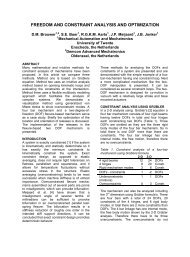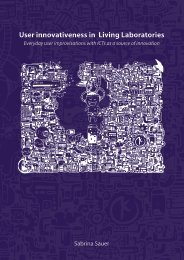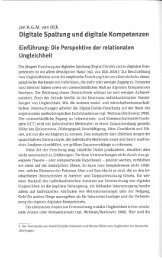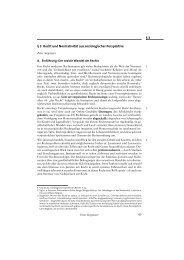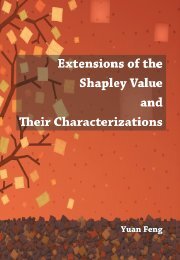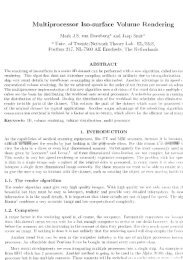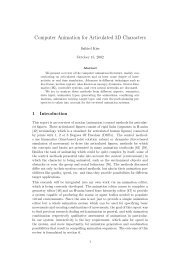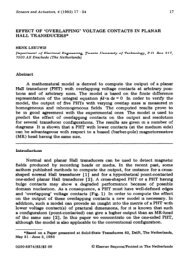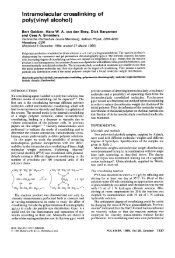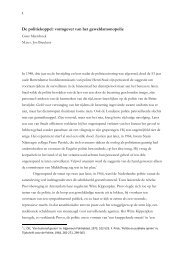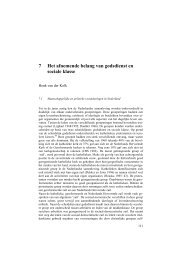Innovation and institutional change: the transition to a sustainable ...
Innovation and institutional change: the transition to a sustainable ...
Innovation and institutional change: the transition to a sustainable ...
Create successful ePaper yourself
Turn your PDF publications into a flip-book with our unique Google optimized e-Paper software.
Stability <strong>and</strong> transformation in <strong>the</strong> electricity system 89<br />
The national government was not able <strong>to</strong> <strong>change</strong> <strong>the</strong> course of <strong>the</strong> events,<br />
because of <strong>the</strong> au<strong>to</strong>nomous position of genera<strong>to</strong>rs 14 . Due <strong>to</strong> lack of<br />
(legislative) steering instruments, <strong>the</strong> Dutch government had no real<br />
influence on what kind of nuclear technology should be used in nuclear<br />
plants. With <strong>the</strong> experience of <strong>the</strong> first nuclear power plants government<br />
decided in 1974 that <strong>the</strong> decision-making competence with regard <strong>to</strong><br />
building new nuclear power plants should be assigned <strong>to</strong> <strong>the</strong> Ministry of<br />
Economic Affairs.<br />
In <strong>the</strong> seventies also public concern for safety, <strong>the</strong> problem of <strong>the</strong> nuclear<br />
waste <strong>and</strong> nuclear proliferation began <strong>to</strong> emerge. Public resistance against<br />
nuclear energy in <strong>the</strong> Ne<strong>the</strong>rl<strong>and</strong>s became more <strong>and</strong> more organised <strong>and</strong> a<br />
national energy debate (BMD) was initiated in <strong>the</strong> beginning of <strong>the</strong> eighties<br />
because of increasing societal concern over future routes of energy supply<br />
developed by government in co-operation with <strong>the</strong> energy supply sec<strong>to</strong>r. The<br />
BMD made clear that opinions regarding <strong>the</strong> future energy supply differed<br />
widely (SMDE, 1983: 3). Two opposing viewpoints were also most strongly<br />
backed by <strong>the</strong>ir followers. One viewpoint viewed expansion of nuclear<br />
energy supply as indispensable (pro-nuclear viewpoint: held by 17-26% of<br />
various groups <strong>and</strong> individuals participating in <strong>the</strong> BMD <strong>and</strong> 13% in a<br />
parallel poll 15 ). This viewpoint was strongly related with <strong>the</strong> opinion that<br />
regarded unrestricted growth of energy use as desirable. The opposing<br />
viewpoint argued for closure of existing nuclear power plants (anti-nuclear<br />
viewpoint: held by 33-58%, parallel poll 37%) <strong>and</strong> was associated with<br />
reduction of energy use. The moderate group, however (held by 16-40%,<br />
parallel poll 50%), held <strong>the</strong> opinion that <strong>the</strong> two nuclear power plants should<br />
be maintained, not exp<strong>and</strong>ed, <strong>and</strong> was associated with slowing down of <strong>the</strong><br />
growth of energy use.<br />
The pro-nuclear viewpoint was most widely held by institutions from <strong>the</strong><br />
electricity sec<strong>to</strong>r. In <strong>the</strong> scientific field <strong>the</strong> department of nuclear energy<br />
from <strong>the</strong> association of engineers (KIVI) is strongly in favour of expansion<br />
of nuclear energy. The Royal Academy of Sciences (KNAW) expresses <strong>the</strong><br />
opinion that ‘<strong>the</strong>re are no scientific arguments not <strong>to</strong> make room for nuclear<br />
energy’. Arguments for nuclear energy given by <strong>the</strong> electricity sec<strong>to</strong>r are:<br />
– With <strong>the</strong> current situation <strong>and</strong> price level for fossil fuels nuclear power is<br />
cheapest as electricity source for <strong>the</strong> base load;<br />
14<br />
Although provinces <strong>and</strong> municipalities owned <strong>the</strong> genera<strong>to</strong>rs, <strong>the</strong>y acted like private<br />
companies.<br />
15<br />
Discussion in <strong>the</strong> BMD <strong>to</strong>ok place at local level, through sessions with societal<br />
organisations, discussions in education, <strong>and</strong> through <strong>institutional</strong> participation. A parallel<br />
poll was held <strong>to</strong> poll opinions in Dutch society independent of whe<strong>the</strong>r active participation<br />
in <strong>the</strong> BMD <strong>to</strong>ok place.



